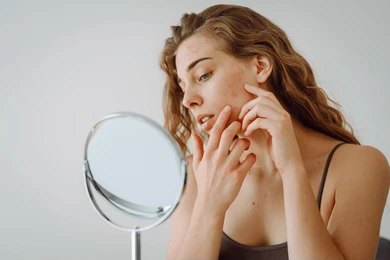Acne is one of the most common skin conditions that affect people of all ages. Whether it’s caused by hormonal changes, stress, or diet, acne can have a significant impact on your self-confidence. Fortunately, there are various treatments available that can help clear your skin and prevent future breakouts. In this post, we’ll explore some of the best acne treatments and tips for maintaining healthy, acne-free skin.
1. Understanding Acne and Its Causes
Before diving into treatments, it’s important to understand what acne is and why it occurs. Acne happens when hair follicles become clogged with oil, dead skin cells, and sometimes bacteria. This leads to the formation of pimples, blackheads, and cysts. Common causes of acne include:
- Hormonal changes (especially during puberty, menstruation, or pregnancy)
- Dietary factors, like consuming greasy or sugary foods
- Stress and anxiety
- Environmental factors (pollution, humidity)
- Genetics
Understanding these triggers can help you make informed decisions about the best acne treatment for your skin.
2. Top Acne Treatments: What Works?
There are many options when it comes to treating acne. Here are five of the most effective treatments:
Topical Creams and Gels
Over-the-counter creams containing ingredients like benzoyl peroxide, salicylic acid, or retinoids are often the first line of defence against acne. These ingredients work by reducing inflammation, clearing clogged pores, and preventing new breakouts.
Oral Medications
For more severe acne, a dermatologist may recommend oral medications such as antibiotics or hormonal treatments. These can help reduce inflammation and control the bacteria responsible for acne.
Chemical Peels
Chemical peels involve applying a solution to the skin to exfoliate dead skin cells, unclog pores, and improve skin texture. They can help reduce acne scars and prevent new breakouts. This treatment is often done in a dermatologist’s office.
Laser Therapy
Laser treatments are becoming increasingly popular for acne treatment. They work by targeting the sebaceous glands (which produce oil) to reduce excess oil and bacteria on the skin, leading to clearer skin over time.
Microdermabrasion
This non-invasive treatment gently exfoliates the skin, removing dead skin cells and promoting the growth of new, healthy skin. It can help reduce acne scars and improve skin tone.
3. Natural Remedies: Do They Work?
While professional treatments are highly effective, some people prefer to try natural remedies for their acne. These options can be gentle on the skin and may help with mild breakouts. Some popular natural remedies include:
- Tea tree oil: Known for its antibacterial properties, tea tree oil can help kill acne-causing bacteria.
- Aloe vera: Known for its soothing properties, aloe vera can reduce inflammation and redness.
- Honey: With its natural antibacterial properties, honey can help fight acne and promote healing.
While natural remedies can be helpful, they may not be as effective for more severe cases of acne.
4. When to See a Dermatologist
If your acne doesn’t respond to over-the-counter treatments or if it’s causing significant scarring, it’s time to see a dermatologist. A professional can assess your skin and recommend a personalised treatment plan, which may include prescription medications or in-office procedures like chemical peels or laser therapy.
If you’re looking for the Best Acne Treatment in Kampala, Refine Skin and Body offers professional treatments that can help you achieve clear and healthy skin. Their expert dermatologists use the latest technology to treat acne effectively, with minimal downtime.
5. Tips for Preventing Acne
Prevention is key to maintaining clear skin. Here are a few tips to help you avoid future breakouts:
- Maintain a consistent skincare routine: Use a gentle cleanser and non-comedogenic products that won’t clog your pores.
- Avoid touching your face: Your hands carry bacteria, which can transfer to your skin and lead to breakouts.
- Keep your hair clean and away from your face: Oily hair can contribute to acne, so wash your hair regularly and avoid letting it touch your skin.
- Stay hydrated and eat a balanced diet: Drink plenty of water and eat foods rich in vitamins and antioxidants to support skin health.
Conclusion
Acne is a common issue, but with the right treatment, it is completely manageable. Whether you choose over-the-counter products, professional treatments, or natural remedies, the key to success is finding what works best for your skin type and sticking to a consistent routine.
